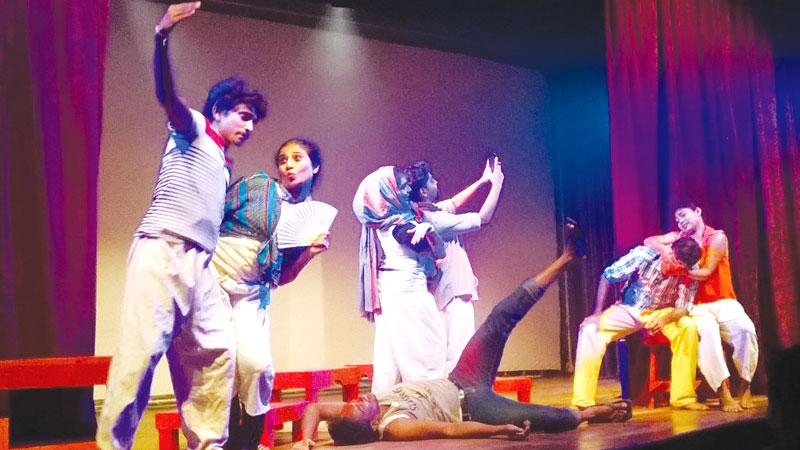
A review of the play Vikarama Handeva
The skilled comedian is one who wields the power of casting a spell over his audience. Exceptional comedians win praise and admiration. Saddavidda Palanga Pathirana Muthukumarana Rajapaksha alias ‘Andare’ the court jester, village trickster and witty prankster is a historical figure whose legend lives in cherished Sinhala lore. What would the face of this historical figure be like if one were to make a statue in his honour? A search for a ‘suitable face’ to depict ‘Andare’ by a sculptor who has been commissioned to create a statue in his honour was the opening premise of the stage play Vikarama Handeva by Akhila Sapumal which was performed at the Punchi Theatre on 17 December.
The play’s title can be translated to English as ‘An evening of absurdist theatre’. It is a work scripted on a story concept of Ariyawansa Ranaweera. The performance consisted of a series of sketches or episodes that weave a situation where the nonsensical reflects absurd ways in which people and society formulate meaning in our individual and collective lives. The performance was delivered by a talented ensemble of thespians and consisted of a minimalist stage set design.
The first sketch depicts a scenario in a train station where couples with various issues between them wait for a train and become animated and spurred out of their dullness when a person dies in plain sight. The immediate reaction of the people at the station is to start snapping ‘selfies’ with the corpse from their phones’ cameras. This speaks of how moronically immersed people are becoming with narcissistic feelings and degrade human values of old. The second sketch shows the legendary meeting between Alexander the Great of Macedonia and the cynic philosopher Diogenes of Sinope. In an interesting turn of events Alexander is shown to infiltrate ‘the armour of apathy’ Diogenes has to keep materialist desires outside his door. Gifts are sent to the wife of Diogenes to the extent that their simple household is overrun with furniture and household items, leaving no space for Diogenes and his wife to occupy.
The final sketch depicts how our own political planning for so called development, completely disregards the realities of poverty faced by Sri Lankans in rural areas where half a dozen coconut trees can be more vital for the survival of a family than power lines to provide electricity to their village. It was particularly an impactful sketch that showed with humour that suddenly turns its dark underbelly up to the audience. If ‘Development’ for the villagers comes at the cost of destroying the meagre agricultural resources that they depend on for their survival, then what they in fact face is not ‘illumination’ but the darkness of death.
Finally, the master narrator of the play asks the audience which of the faces seen onstage would befit a model to mould the face of Andare for the statue he has been commissioned to create. Could it be just one or a combination of many of the faces he asks? Perhaps we are all at the end of the day party to the absurdities that go on in our society that render our days bereft of meaning. Therefore the ‘humour’ that we party to in the light of what is shown in this play is ‘dark humour’ that signposts how we are slowly digging our collective societal grave.
Through witty dialogue and captivating scenarios Akhila Sapumal presents a work of theatre that can carry an impactful message to contemporary society that is getting enmeshed senselessly in the ever increasing rapaciously consumerist race that is getting accelerated in this digital age generating more and more absurdness in the folds of ‘modern society’. I feel this stage play is one that should be shown to schoolchildren of present. Vikarama Handeva is a work of Sinhala theatre to be saluted.

